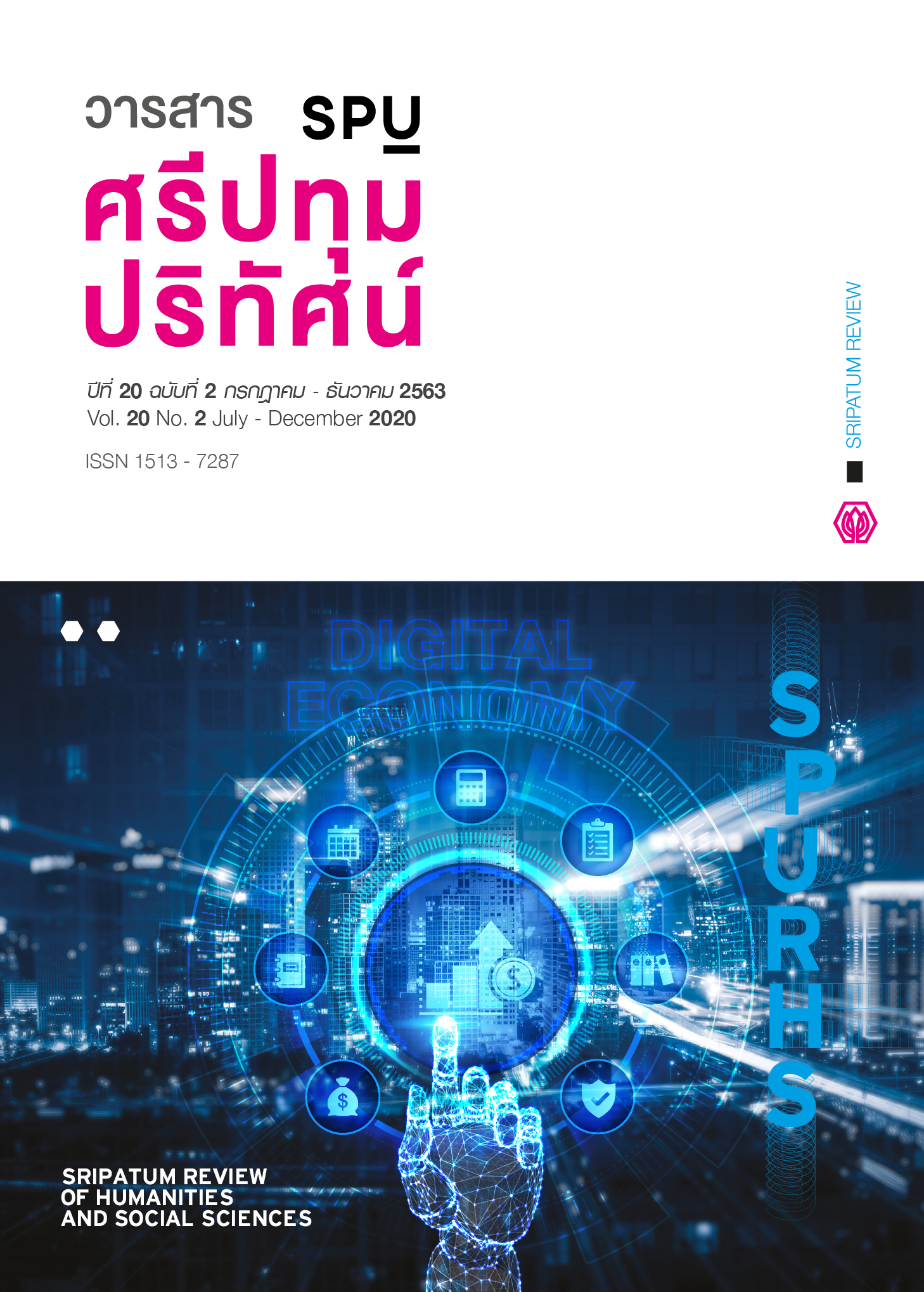Guidelines for Professional Competency Development of Thai Accountants in the Digital Economy Era
Main Article Content
Abstract
The purposes of this research are (1) to study the needs for development of Thai accountants' competency in the digital economy era; (2) to study the guidelines for developing Thai accountants' competency for working in the digital economy era; and (3) to assess the effects of different levels of development among three different operation characteristics of the national accounting firms in Thailand.This research applied both qualitative and quantitative research methods. In the qualitative research, the researcher conducted in-depth interviews with 9 senior managers of quality national accounting firms. In the quantitative research, the researcher used a questionnaire to collect data from 335 senior accountants from national accounting firms in Bangkok Metropolitan area, and then used the descriptive statistics in analyzing the quantitative data. The findings of this research indicate that the need and guidelines for professional competency development of Thai accountants in the digital economy era comprise 9 professional competency areas which are the adaptation for digital transformation, technical knowledge and ethics, professional skills, thinking outside the box, analysis of big data, communication skills, being a consultant, strategic planning and effective management, and continuing professional development. It will focus on professional competency development of Thai accountants for having communication skill regarding the overall of financial report and self-learning through online media. The hypothesis testing result shows that the effect of different level of development among three different operation characteristics of national accounting firms in Thailand are not significantly different.
Article Details
1. กองบรรณาธิการสงวนสิทธิ์ในการพิจารณาและตัดสินการตีพิมพ์บทความในวารสาร
2. บทความทุกเรื่องจะได้รับการตรวจสอบทางวิชาการโดยผู้ทรงคุณวุฒิ แต่ข้อความและเนื้อหาในบทความที่ตีพิมพ์เป็นความรับผิดชอบของผู้เขียนแต่เพียงผู้เดียว มิใช่ความคิดเห็นและความรับผิดชอบของมหาวิทยาลัยศรีปทุม
3. การคัดลอกอ้างอิงต้องดำเนินการตามการปฏิบัติในหมู่นักวิชาการโดยทั่วไป และสอดคล้องกับกฎหมายที่เกี่ยวข้อง
References
Aaker, D. A., Kumar, V. and Day, G., S. (2001). Marketing Research. 7th ed. New York: John Wiley and sons.
Albu, N. (2012). Image is Contribution in Romania Enterprise. Contribution Expertise Audit, 1, 6-11.
Armstrong, J. S. and Overton, T., S. (1977). Estimating Nonresponse Bias in Mail Surveys. Journal of Marketing Research, 14(3), 396-402.
Cronbach, L., J. (1951). Coefficient Alpha and The Internal Structure of Tests. Psychometrika, 16(3), 297-334.
Department of Business Development. (2019). Number of Accounting Offices. [online]. Retrieved October 27, 2019 from https://dbd.go.th_new_view. (in Thai)
Department of Business Development. (2019). The Importance of Accountants for Business in the Digital Economy and Society Era. [Online]. Retrieved October 14, 2019 from https://dbd.go.th. (in Thai)
Dillman, D., A. (1978). Mail and Telephone Surveys: The Total Design Method. New York: Wiley.
Dunbar, I. (2017). Back to Basics: The Cloud for Accountants. [Online]. Retrieved November 29, 2019 from: https://acuitymag.com/technology.
Federation of Accounting Professions. (2019). Summary International Conference 2016. [Online]. Retrieved November 18, 2019 from: http://tfac.or.th_Artical_Detail_pdf. (in Thai)
Gustafsson, J. (2015). Identify of Moonlighter: Digitalization Strategy. Entrepreneurship, 4(12),12-15.
Kittiwutikrai, M. and Chaisawaneeyakorn, M. (2017). The Characteristics of Graduates in Accounting by Enterprises’s Requirement in Mukdahan Province. VRU Research and Development Journal Humanities and Social Science, 12(1), 27-37. (in Thai)
Kornvittayasil, S. (2016). Accountants and Thailand 4.0. [Online]. Retrieved November 21, 2019 from: http://fap.or.th./images_column_1477650726/Thailand%204_0.pdf. (in Thai)
Krosnick, J., A, Judd, C., M., and Wittenbrink, B. (2005). The Measurement of Attitudes. In: Albarracin D, Johnson BT, Zanna MP, editors. The Handbook of Attitudes. Mahwah: Lawrence Erlbaum, 21–78.
Leipzig, V., Gamp, T., M., Manz, D., Schottle, K., Ohlhausen, P., Oosthuizen, G., and Leipzig, D., K. (2017). Initializing Customer-orientated Digital Transformation in Enterprise. Procardia Manufacturing, 8, 517-524, Doi: 10.1016/j.promfg.2017.02.066.
Liu, M., Wu, K., and Xu, J. J. (2019). How Will Blockchain Technology Impact Auditing and Accounting: Permissionless versus Permissioned Blockchain. Current Issues in Auditing, 13(2), 19-29.
Lonescu, B., S., Prichici, C., and Tudoran, L. (2014). Cloud Accounting A Technology that May Change the Accounting Profession in Romania, Audit Finance, 12(110), 3-15.
Maesincee, S. (2016). Thailand 4.0: Strengthen from within Linking the Thai Economy to the World. Eco-Challenge Magazine, 11 (3), 5-9. (in Thai)
Maneemai, P., Chalearnkitjarukorn, P., Chosas, P., Saetan, A., Raksavong, R., and Preamjit, T. (2016). Quality Control and Factor Affecting Quality of Performance Work of the Small and Medium Accounting Office of Thailand. Modern Management Journal, 14(1), 117-128. (in Thai)
National Statistical Office. (2019). Number of Firms Use Technology Digital for Organizational Management. [online]. Retrieved October 16, 2019 from: http://nso.go.th. (in Thai)
Padberg, M. (2015). Big Data and Business Intelligence: A Data-driven Strategy for e-Commerce Organizations in the Hotel Industry. [Online]. Retrieved November 14, 2019 from: https://essay.utwente.nl/68095/1Padberg MA MB.pdf.
Pan, G. and Seow, P., S. (2016). Preparing Accounting Graduates for Digital Revolution: A Critical Review of IT Competencies and Skills Development. Journal of Education for Business, 91(3), 166–75
Perdana, A., Robb, A., and Birt, J. (2016). Blockchain, Forensic Accounting, and Research Opportunities. 4th Forensic Accounting Teaching and Research Symposium, Gold Coast, Australia. [Online]. Retrieved November 16, 2019 from: https://bond.edu.au_/intl/symposium program.
Prochazka, D. (2018). Accounting for Bitcoin and Other Cryptocurrencies under IFRS: A Comparison and Assessment of Competing Models. The International Journal of Digital Accounting Research, 18, 161-188.
Ravinelli, R. J., and Hambleton, R., K. (1977). On the Use of Content Specialists in the Assessment of Criterion-Referenced Test Item Validity. Dutch Journal of Educational Research, 2, 49-60.
Riddell, C. (2016). Digital Disruption Transforming the Finance Sector. [Online]. Retrieved November 5, 2019 from: https://acuitymag.com/opinion/digital disruption transforming the finance sector.
Tekbas, I. (2018). The Profession of the Digital Age: Accounting Engineering. [Online]. Retrieved November 18, 2019 from: http://ifac.org_pareparing_future_ready_professionals.pdf.
Tubtimcharoon, N. (2018). The Professional Competency Development of The Business of Small Hotels in Digital Economy Age in Thailand. Sripatum Review of Humanities and Social Sciences, 18(2), 42-54. (in Thai)
Vanitbancha, K. (2012). Statistics for research. Bangkok: Thammasarn. (in Thai)
Yamane. T. (1973). Statistics: An Introductory Analysis. 3rd ed. New York. Harper and Row Publications.


